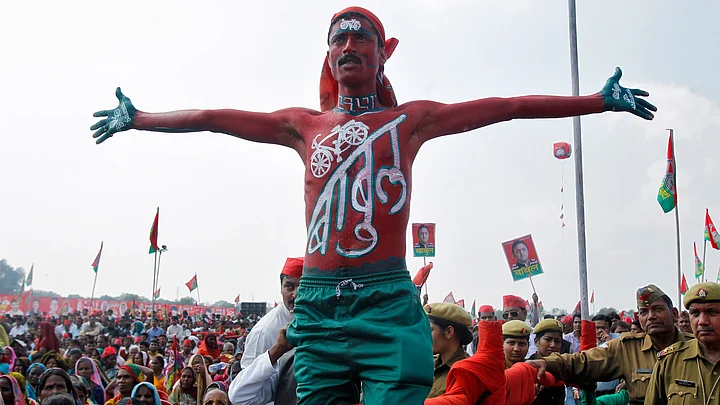India’s age-old varna system, that of dividing society into hierarchical factions based on their traditional role has had a profound effect on politics as well. Rise in the number of caste-based parties that draw support owing to specific ethnic commonality are the by-products of this ‘brahminical’ order. This evolution resulted in the consolidation of votes, with those at the bottom of the pyramid, participating actively in the electoral process to assert themselves. As the professor of politics at New York University, Kanchan Chandra has rightly termed it as the Patronage Politics, wherein the trickle-down benefits determine in whose favour votes will be casted.
Two castes often pitted against each other as they vie for certain benefits and social recognition are the Kurmis and the Yadavs. Both are agriculture-based communities found predominantly in the states of Uttar Pradesh and Bihar. While in Bihar an attempt has been made to bring them together under the umbrella of the Janta alliance, in UP, Kurmis rally behind parties such as Bahujan Samaj Party (BSP) and Apna Dal while the Yadavs proudly associate themselves with the Samajwadi Party (SP).
Attempts to bring the two castes together were done earlier as well. In 1936, a political outfit by the name of Triveni Sangh was floated by a group of Yadav and Kurmi leaders. As Christophe Jafrelot describes in his book, India’s silent revolution, the political ambitions of the Triveni Sangh received a jolt once the Congress owing to its insecurities started co-opting some of the leaders belonging to backward castes. A clash of egos also ensured that Kurmis and Yadavs started working independently towards the objective of social upward mobility.
Brief History
It was in 1894 when the Kurmis had lodged a protest in Lucknow against the decision of the British government to reduce their strength in the police. As author Maria Misra puts it in her book Vishnu’s Crowded Temple on the faceoff between the Yadavs and the Kurmis:
But efforts to unite with the Yadavs foundered on internal status jockeying – the Yadavs insisting on their superior descent. Rather than make common cause with the Kurmis and Koeris, the Yadavs manifested their superiority complex by, for example, demanding the formation of a separate Yadav regiment in the Indian Army after the 1962 Indo-China war…
In order to overcome the factionalism prevalent among the Kurmis, a common refrain in the 90s was “Upjati chodo, Patel jodo” (don’t go by the sub-caste, unite as a single caste).
Political Mobilisation in UP
The mandal era was a phase that witnessed Mulayam Singh led Samajwadi Party projecting itself as a party of the Yadavs. For the Yadavs, the process of Sanskritisation (phenomenon of climbing up the social ladder) meant acquiring for themselves an Aryan past, linking their descent to Lord Krishna belonging to the caste of cow-herders unlike the Kurmis who claimed to have Kshatriya warriors as ancestors.
From 7.14% in 1989 during Mulayam Singh’s government to constituting 15.38% of Akhilesh’s cabinet in 2012, what is commonly referred to as Yadavisation, has slowly crept even into the police force. According to an Indian Express report in 2007 indicated that almost 36% of UP cops being Yadavs they far outnumber their population in the state.
Political Mobilisation in Bihar
The Yadavs have been the traditional vote bank of Lalu since the 1990s. An infamous slogan coined by Lalu at that time said -- Bhoora Baal Hatao (a clarion call to remove Bhumihar, Rajputs, Brahmins and Lalas from the seats of power).
If the Yadavs had finally found their neta in Lalu, it took no time for the Kurmis to lend their support to Nitish with the sole objective of asserting their identity. It was on February 12, 1994 when leaving behind all inhibitions of formally associating himself with a particular caste, Nitish addressed the Kurmi Chetana Maha Rally at Gandhi Maidan in Patna.
This event was soon followed by Nitish calling it quits with the Lalu-led Janta Dal and forming his own Samta Party in October 1994. Thus, political leaders had finally decided to cash upon years of subjugation and ignominy being borne by a community.
(At The Quint, we question everything. Play an active role in shaping our journalism by becoming a member today.)
